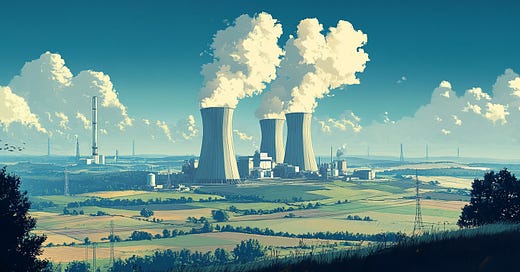🌳 🌈 Time for a hard reset for environmental policy: A Quick Q&A with … Emily Domenech
'The Trump Administration will take every step within its regulatory authority to fast-track and dismantle the regulations put in place by the Biden Administration, particularly regarding NEPA'
The road to infrastructure stagnation is paved with good intentions.
In the world of environmental policy, those seeking to protect the country's natural landscape from sea to shining sea have leveraged policies like the National Environmental Policy Act, the Clean Water Act, and Endangered Species Act via lawsuits to block the very innovations that might reduce Americans' environmental impact. It's clear on both sides of the political aisle that environmental policy reform is long overdue. American infrastructure improvement can't continue to be held hostage in the courtroom.
But after over a year of bipartisan negotiations, the failure of the Energy Permitting Reform Act to pass last year signaled just how deep the challenges are to true reform. After coming across her article, “Environmentalists are suing us out of addressing climate change,” I asked Emily Domenech a few quick questions about the extent of these challenges and what meaningful, realistic reform might look like.
Domenech is the senior vice president of Boundary Stone Partners, a government affairs and strategic communications consulting firm focused on the intersection of technology, policy, and finance.
She was previously senior policy advisor to Speaker of the House Kevin McCarthy, Speaker Pro Tempore Patrick McHenry, and Speaker Mike Johnson. During this time, she managed the Committees on Energy and Commerce, Transportation and Infrastructure, Natural Resources, Agriculture, Science, Space, and Technology.
1/ Why did the bipartisan bill fail? Everyone seems to think this is a problem so why is progress so hard?
Everyone loves the idea of "permitting reform," but the two sides don't agree on what that entails!
To most Republicans, permitting reform means making it easier to build large projects in America — be it a road, a bridge, an energy project, or a waterway — and removing the federal barriers to activities on federal land, including forest management, energy production, and mining. To many Democrats, permitting reform means changing the way our electricity markets operate to incentivize and speed construction of major transmission lines, or removing federal hurdles to renewable energy projects.
The bipartisan Manchin-Barrasso bill (S.4753, the Energy Permitting Reform Act of 2024 or "EPRA") had two significant challenges.
First, the scope of the bill was only within the jurisdiction of the Senate Energy and Natural Resources Committee. This limited "Republican" provisions to primarily federal leasing and LNG exports and left out top priorities for House Republicans — including reforms to the National Environmental Policy Act (NEPA) and the Clean Water Act (CWA).
Second, proponents of the bill focused almost entirely on political dynamics in the Senate leading up to the November election and were unprepared for the shift in priorities following the Republican sweep. With leasing reforms on the docket for a future reconciliation package, EPRA's primary trade — more oil and gas production in exchange for transmission reforms — no longer made sense for Republicans. While Senator Manchin and others did attempt to negotiate with House Republicans on other provisions after the election, there simply wasn't enough time to work out a bipartisan package that made sense for either side.
2/ NGOs initiated over 70 percent of legal challenges against forest management, public land, and energy projects. 80 percent of these lawsuits ultimately fail but cause big delays. What should I make of those facts?
Our federal permitting process has been weaponized as a tool to delay projects until they are no longer financially viable. Rather than examine only projects that could have a tangible, negative impact on the environment, environmental activists use the laws on the books to target everything. When activists can unfairly delay every project — even those where the federal government already conducted a thorough environmental review — they can kill any project simply by creating uncertainty and delays until the developer runs out of money to continue.
Keep reading with a 7-day free trial
Subscribe to Faster, Please! to keep reading this post and get 7 days of free access to the full post archives.




